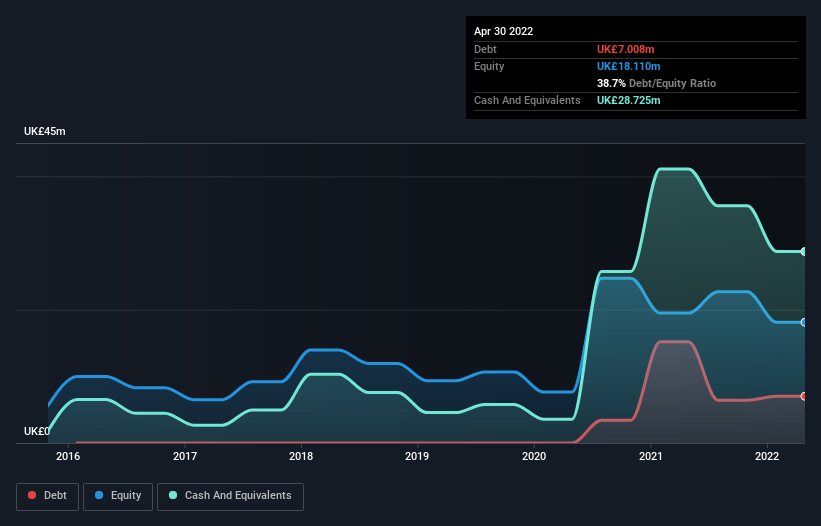Legendary fund manager Li Lu (who Charlie Munger backed) once said, 'The biggest investment risk is not the volatility of prices, but whether you will suffer a permanent loss of capital.' So it might be obvious that you need to consider debt, when you think about how risky any given stock is, because too much debt can sink a company. Importantly, Scancell Holdings plc (LON:SCLP) does carry debt. But should shareholders be worried about its use of debt?
When Is Debt A Problem?
Generally speaking, debt only becomes a real problem when a company can't easily pay it off, either by raising capital or with its own cash flow. Ultimately, if the company can't fulfill its legal obligations to repay debt, shareholders could walk away with nothing. However, a more common (but still painful) scenario is that it has to raise new equity capital at a low price, thus permanently diluting shareholders. Of course, plenty of companies use debt to fund growth, without any negative consequences. When we examine debt levels, we first consider both cash and debt levels, together.
See our latest analysis for Scancell Holdings
What Is Scancell Holdings's Debt?
The image below, which you can click on for greater detail, shows that Scancell Holdings had debt of UK£7.01m at the end of April 2022, a reduction from UK£15.2m over a year. But on the other hand it also has UK£28.7m in cash, leading to a UK£21.7m net cash position.

How Healthy Is Scancell Holdings' Balance Sheet?
We can see from the most recent balance sheet that Scancell Holdings had liabilities of UK£2.14m falling due within a year, and liabilities of UK£18.3m due beyond that. On the other hand, it had cash of UK£28.7m and UK£3.64m worth of receivables due within a year. So it actually has UK£12.0m more liquid assets than total liabilities.
This short term liquidity is a sign that Scancell Holdings could probably pay off its debt with ease, as its balance sheet is far from stretched. Succinctly put, Scancell Holdings boasts net cash, so it's fair to say it does not have a heavy debt load! When analysing debt levels, the balance sheet is the obvious place to start. But it is future earnings, more than anything, that will determine Scancell Holdings's ability to maintain a healthy balance sheet going forward. So if you want to see what the professionals think, you might find this free report on analyst profit forecasts to be interesting.
Given its lack of meaningful operating revenue, Scancell Holdings shareholders no doubt hope it can fund itself until it has a profitable product.
So How Risky Is Scancell Holdings?
By their very nature companies that are losing money are more risky than those with a long history of profitability. And we do note that Scancell Holdings had an earnings before interest and tax (EBIT) loss, over the last year. Indeed, in that time it burnt through UK£11m of cash and made a loss of UK£2.1m. But at least it has UK£21.7m on the balance sheet to spend on growth, near-term. Overall, its balance sheet doesn't seem overly risky, at the moment, but we're always cautious until we see the positive free cash flow. When analysing debt levels, the balance sheet is the obvious place to start. But ultimately, every company can contain risks that exist outside of the balance sheet. For instance, we've identified 3 warning signs for Scancell Holdings (2 make us uncomfortable) you should be aware of.
At the end of the day, it's often better to focus on companies that are free from net debt. You can access our special list of such companies (all with a track record of profit growth). It's free.
New: Manage All Your Stock Portfolios in One Place
We've created the ultimate portfolio companion for stock investors, and it's free.
• Connect an unlimited number of Portfolios and see your total in one currency
• Be alerted to new Warning Signs or Risks via email or mobile
• Track the Fair Value of your stocks
Have feedback on this article? Concerned about the content? Get in touch with us directly. Alternatively, email editorial-team (at) simplywallst.com.
This article by Simply Wall St is general in nature. We provide commentary based on historical data and analyst forecasts only using an unbiased methodology and our articles are not intended to be financial advice. It does not constitute a recommendation to buy or sell any stock, and does not take account of your objectives, or your financial situation. We aim to bring you long-term focused analysis driven by fundamental data. Note that our analysis may not factor in the latest price-sensitive company announcements or qualitative material. Simply Wall St has no position in any stocks mentioned.
About AIM:SCLP
Scancell Holdings
A clinical stage biopharmaceutical company, discovers and develops of immunotherapies for the treatment of cancer in the United Kingdom.
Imperfect balance sheet with very low risk.
Market Insights
Community Narratives



